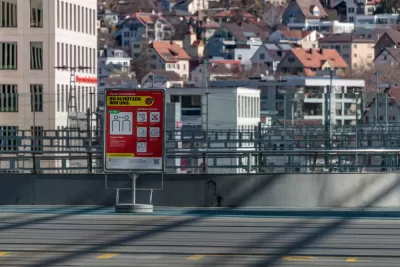A nationwide referendum held on Sunday, Nov. 28, on coronavirus measures enacted by the Swiss federal government, including the controversial Swiss Covid certificate (vaccination verification), passed with 62% of the vote.

The Swiss are unique in practicing direct democracy in the form of holding national referendums up to four times a year. What better way to give a voice to those who view public health measures as an infringement on personal freedom?
"[F]ollowing weeks of vitriolic public debate and protests," the vote wasn't even close, reports Switzerland-based Noele Illien for The New York Times on Nov. 28.
Official government results show 62 percent of voters agreed to keep the amendments parliament made to the nation’s existing Covid law, which includes the introduction of a Covid certificate that shows either proof of vaccination or recovery from the illness and is required to enter public spaces like restaurants or museums.
It is the second time this year that opponents have tried to overturn legislature [sic] introduced by the government in response to the pandemic, by collecting enough signatures to bring the matter to a referendum.
This time opposition focused on getting rid of contact tracing and an internationally recognized Covid certificate.
The election, which included two other measures, "was regarded as a broader referendum on the government’s approach to handling the crisis," reported Corinne Gretler for Bloomberg News on Dec. 3.
The majority failed to be swayed by vociferous skeptics, who argued the passes infringed upon civil liberties and wanted the government to scupper social distancing restrictions generally.
"The results come amid a recent surge in Covid cases in Switzerland, which despite being one of the wealthiest countries in the world, has one of the continent’s lowest vaccination rates," added Illien for the Times.
COVID metrics
Having 67% of the population of 8.2 million fully vaccinated, according to The New York Times tracker on Dec. 7, may be low in Europe, but it's 7 points higher than the U.S. average. Only 11 states and territories have a higher percentage, according to the Times.
Delta is surging in Europe. Switzerland has the world's tenth highest case incidence, 104 cases per 100,000 people, according to the Times, up 68% in the last two weeks. The nations with higher rates are all in Europe save for #2, the Cayman Islands. Daily new cases in the U.S. are 36 per 100k, up 25% in the last two weeks.
An interactive graph in the source article shows that the 7-day average of daily new cases on Dec. 5 was 8,257, just barely edging out the prior highest in the pandemic on Nov. 8, 2020.
More restrictions
Five days after the referendum, the Federal Council decided to expand the use of the Covid certificate effective Dec. 6, added Gretler of Bloomberg News.
All indoor public events will require a Covid certificate, which shows that the holder has been vaccinated, recovered from or tested negative for the coronavirus, the government said Friday. Public institutions and event organizers can exclude the unvaccinated [i.e., a negative test result wouldn't allow access].
A proposal to make working from home mandatory for all, or at least the unvaccinated, failed to win support. Instead, the government is urging people to work from home and said those in offices will need to wear masks.
"These measures reflect the sharp rise in the number of COVID-19 patients admitted to hospital and the emergence of the new Omicron variant," according to the council's press release.
The new measures will remain in place until 24 January 2022. In addition, stricter rules on testing will come into force for persons entering the country. In return, all countries will be removed from the current quarantine list.
Last words go to Interior Minister Alain Berset, one of the seven members of the Federal Council, as reported by Illien in the source article.
In response to the outcome [of the referendum], which saw one of the highest voter turnouts in decades, the Interior Minister Alain Berset commented on the tone of the opposition and its demonstrations that sometimes turned violent. “What does not belong to Switzerland is anger, hatred, intimidation and threats,” he said.
“We all want to end the pandemic as quickly as possible and that can only be done together,” he said.
Related in Planetizen:
- Compulsory Vaccination in the Birthplace of Democracy, December 6, 2021
- Austria to Mandate COVID-19 Vaccination, November 22, 2021
- Global COVID Death Toll Reaches Another Grim Milestone [Europe is epicenter], November 10, 2021
FULL STORY: Swiss voters approve their government’s Covid policy in a referendum.

Planetizen Federal Action Tracker
A weekly monitor of how Trump’s orders and actions are impacting planners and planning in America.

Maui's Vacation Rental Debate Turns Ugly
Verbal attacks, misinformation campaigns and fistfights plague a high-stakes debate to convert thousands of vacation rentals into long-term housing.

San Francisco Suspends Traffic Calming Amidst Record Deaths
Citing “a challenging fiscal landscape,” the city will cease the program on the heels of 42 traffic deaths, including 24 pedestrians.

Amtrak Rolls Out New Orleans to Alabama “Mardi Gras” Train
The new service will operate morning and evening departures between Mobile and New Orleans.

The Subversive Car-Free Guide to Trump's Great American Road Trip
Car-free ways to access Chicagoland’s best tourist attractions.

San Antonio and Austin are Fusing Into one Massive Megaregion
The region spanning the two central Texas cities is growing fast, posing challenges for local infrastructure and water supplies.
Urban Design for Planners 1: Software Tools
This six-course series explores essential urban design concepts using open source software and equips planners with the tools they need to participate fully in the urban design process.
Planning for Universal Design
Learn the tools for implementing Universal Design in planning regulations.
Heyer Gruel & Associates PA
JM Goldson LLC
Custer County Colorado
City of Camden Redevelopment Agency
City of Astoria
Transportation Research & Education Center (TREC) at Portland State University
Jefferson Parish Government
Camden Redevelopment Agency
City of Claremont





























